Genocide: Understanding the Crime and International Responsibility
VerifiedAdded on 2023/03/31
|11
|3228
|399
AI Summary
This document provides an in-depth analysis of the crime of genocide, its definition, and the international legal responsibilities of states. It discusses the role of the International Criminal Court in prosecuting genocide and highlights the importance of preventing and punishing this heinous crime. The document also explores the impact of genocide on communities and the measures taken to address it.
Contribute Materials
Your contribution can guide someone’s learning journey. Share your
documents today.
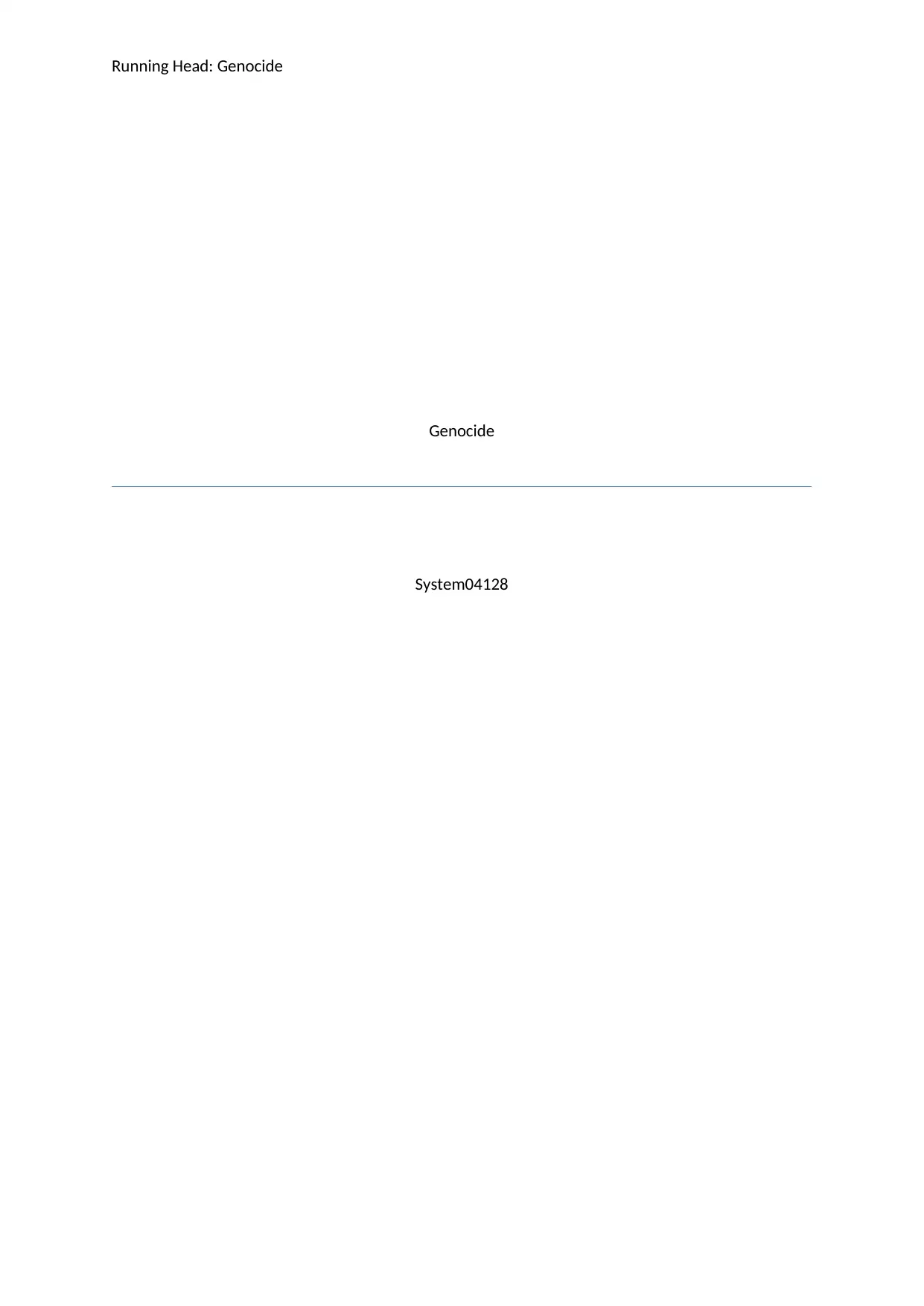
Running Head: Genocide
Genocide
System04128
Genocide
System04128
Secure Best Marks with AI Grader
Need help grading? Try our AI Grader for instant feedback on your assignments.
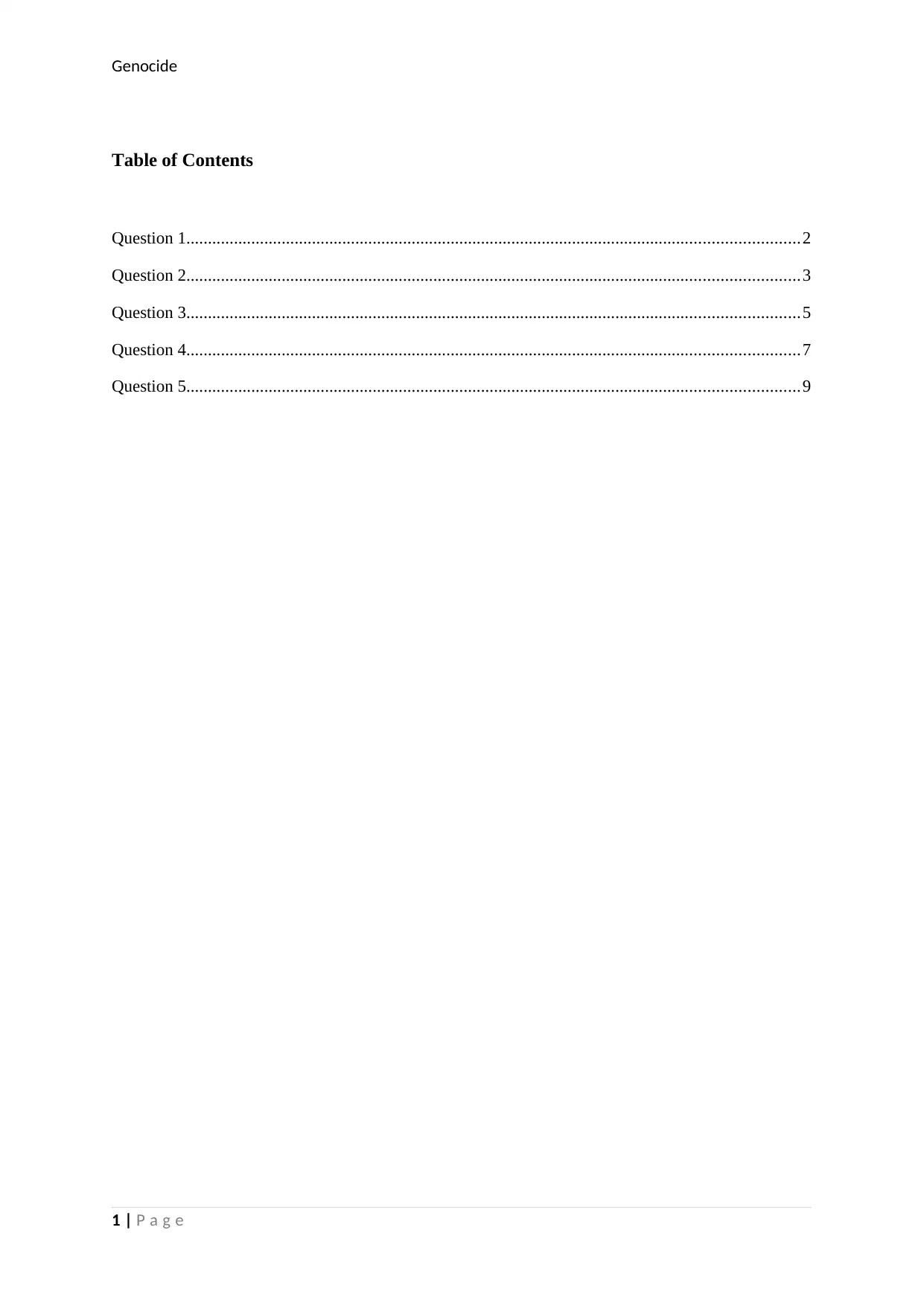
Genocide
Table of Contents
Question 1.............................................................................................................................................2
Question 2.............................................................................................................................................3
Question 3.............................................................................................................................................5
Question 4.............................................................................................................................................7
Question 5.............................................................................................................................................9
1 | P a g e
Table of Contents
Question 1.............................................................................................................................................2
Question 2.............................................................................................................................................3
Question 3.............................................................................................................................................5
Question 4.............................................................................................................................................7
Question 5.............................................................................................................................................9
1 | P a g e
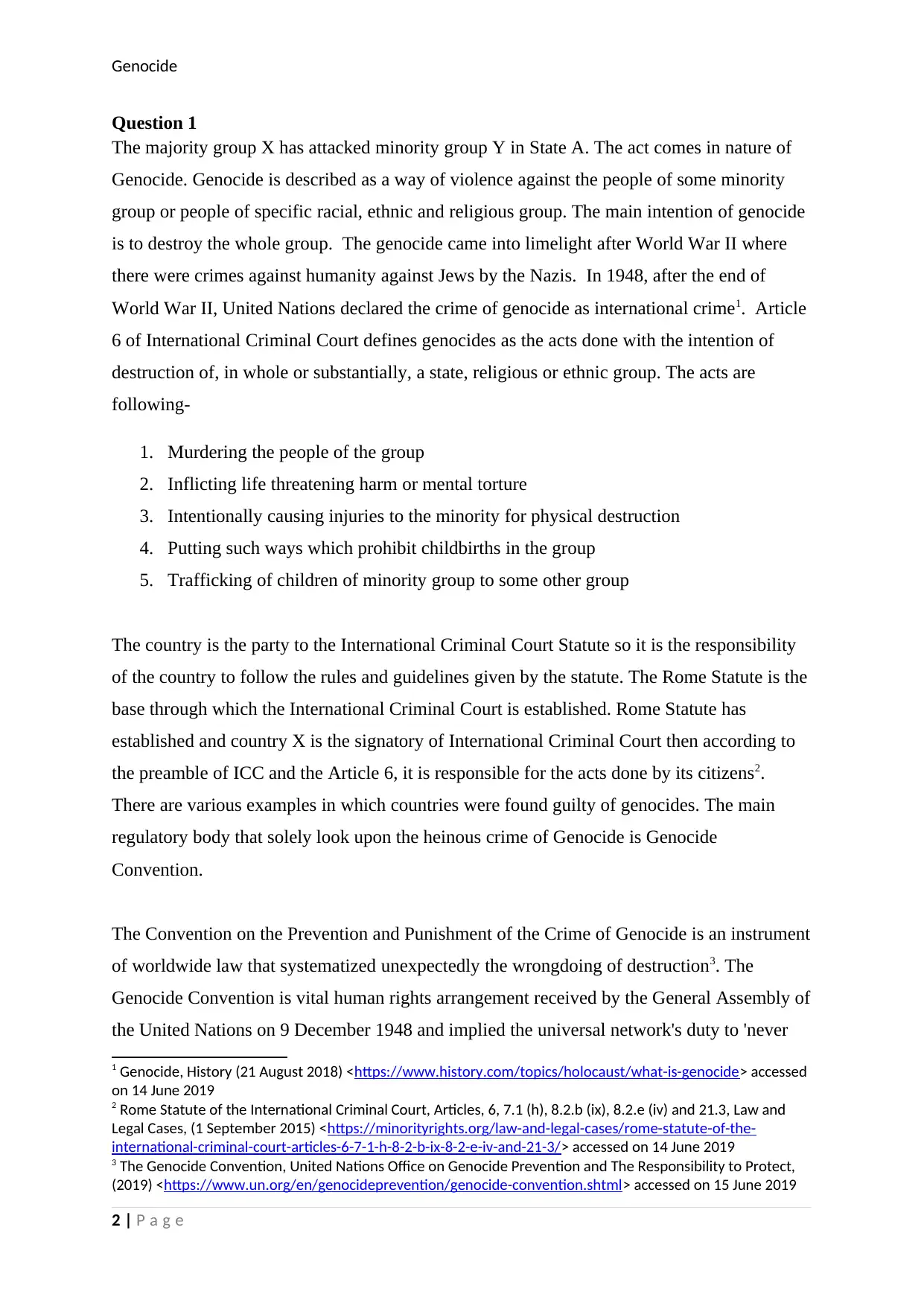
Genocide
Question 1
The majority group X has attacked minority group Y in State A. The act comes in nature of
Genocide. Genocide is described as a way of violence against the people of some minority
group or people of specific racial, ethnic and religious group. The main intention of genocide
is to destroy the whole group. The genocide came into limelight after World War II where
there were crimes against humanity against Jews by the Nazis. In 1948, after the end of
World War II, United Nations declared the crime of genocide as international crime1. Article
6 of International Criminal Court defines genocides as the acts done with the intention of
destruction of, in whole or substantially, a state, religious or ethnic group. The acts are
following-
1. Murdering the people of the group
2. Inflicting life threatening harm or mental torture
3. Intentionally causing injuries to the minority for physical destruction
4. Putting such ways which prohibit childbirths in the group
5. Trafficking of children of minority group to some other group
The country is the party to the International Criminal Court Statute so it is the responsibility
of the country to follow the rules and guidelines given by the statute. The Rome Statute is the
base through which the International Criminal Court is established. Rome Statute has
established and country X is the signatory of International Criminal Court then according to
the preamble of ICC and the Article 6, it is responsible for the acts done by its citizens2.
There are various examples in which countries were found guilty of genocides. The main
regulatory body that solely look upon the heinous crime of Genocide is Genocide
Convention.
The Convention on the Prevention and Punishment of the Crime of Genocide is an instrument
of worldwide law that systematized unexpectedly the wrongdoing of destruction3. The
Genocide Convention is vital human rights arrangement received by the General Assembly of
the United Nations on 9 December 1948 and implied the universal network's duty to 'never
1 Genocide, History (21 August 2018) <https://www.history.com/topics/holocaust/what-is-genocide> accessed
on 14 June 2019
2 Rome Statute of the International Criminal Court, Articles, 6, 7.1 (h), 8.2.b (ix), 8.2.e (iv) and 21.3, Law and
Legal Cases, (1 September 2015) <https://minorityrights.org/law-and-legal-cases/rome-statute-of-the-
international-criminal-court-articles-6-7-1-h-8-2-b-ix-8-2-e-iv-and-21-3/> accessed on 14 June 2019
3 The Genocide Convention, United Nations Office on Genocide Prevention and The Responsibility to Protect,
(2019) <https://www.un.org/en/genocideprevention/genocide-convention.shtml> accessed on 15 June 2019
2 | P a g e
Question 1
The majority group X has attacked minority group Y in State A. The act comes in nature of
Genocide. Genocide is described as a way of violence against the people of some minority
group or people of specific racial, ethnic and religious group. The main intention of genocide
is to destroy the whole group. The genocide came into limelight after World War II where
there were crimes against humanity against Jews by the Nazis. In 1948, after the end of
World War II, United Nations declared the crime of genocide as international crime1. Article
6 of International Criminal Court defines genocides as the acts done with the intention of
destruction of, in whole or substantially, a state, religious or ethnic group. The acts are
following-
1. Murdering the people of the group
2. Inflicting life threatening harm or mental torture
3. Intentionally causing injuries to the minority for physical destruction
4. Putting such ways which prohibit childbirths in the group
5. Trafficking of children of minority group to some other group
The country is the party to the International Criminal Court Statute so it is the responsibility
of the country to follow the rules and guidelines given by the statute. The Rome Statute is the
base through which the International Criminal Court is established. Rome Statute has
established and country X is the signatory of International Criminal Court then according to
the preamble of ICC and the Article 6, it is responsible for the acts done by its citizens2.
There are various examples in which countries were found guilty of genocides. The main
regulatory body that solely look upon the heinous crime of Genocide is Genocide
Convention.
The Convention on the Prevention and Punishment of the Crime of Genocide is an instrument
of worldwide law that systematized unexpectedly the wrongdoing of destruction3. The
Genocide Convention is vital human rights arrangement received by the General Assembly of
the United Nations on 9 December 1948 and implied the universal network's duty to 'never
1 Genocide, History (21 August 2018) <https://www.history.com/topics/holocaust/what-is-genocide> accessed
on 14 June 2019
2 Rome Statute of the International Criminal Court, Articles, 6, 7.1 (h), 8.2.b (ix), 8.2.e (iv) and 21.3, Law and
Legal Cases, (1 September 2015) <https://minorityrights.org/law-and-legal-cases/rome-statute-of-the-
international-criminal-court-articles-6-7-1-h-8-2-b-ix-8-2-e-iv-and-21-3/> accessed on 14 June 2019
3 The Genocide Convention, United Nations Office on Genocide Prevention and The Responsibility to Protect,
(2019) <https://www.un.org/en/genocideprevention/genocide-convention.shtml> accessed on 15 June 2019
2 | P a g e
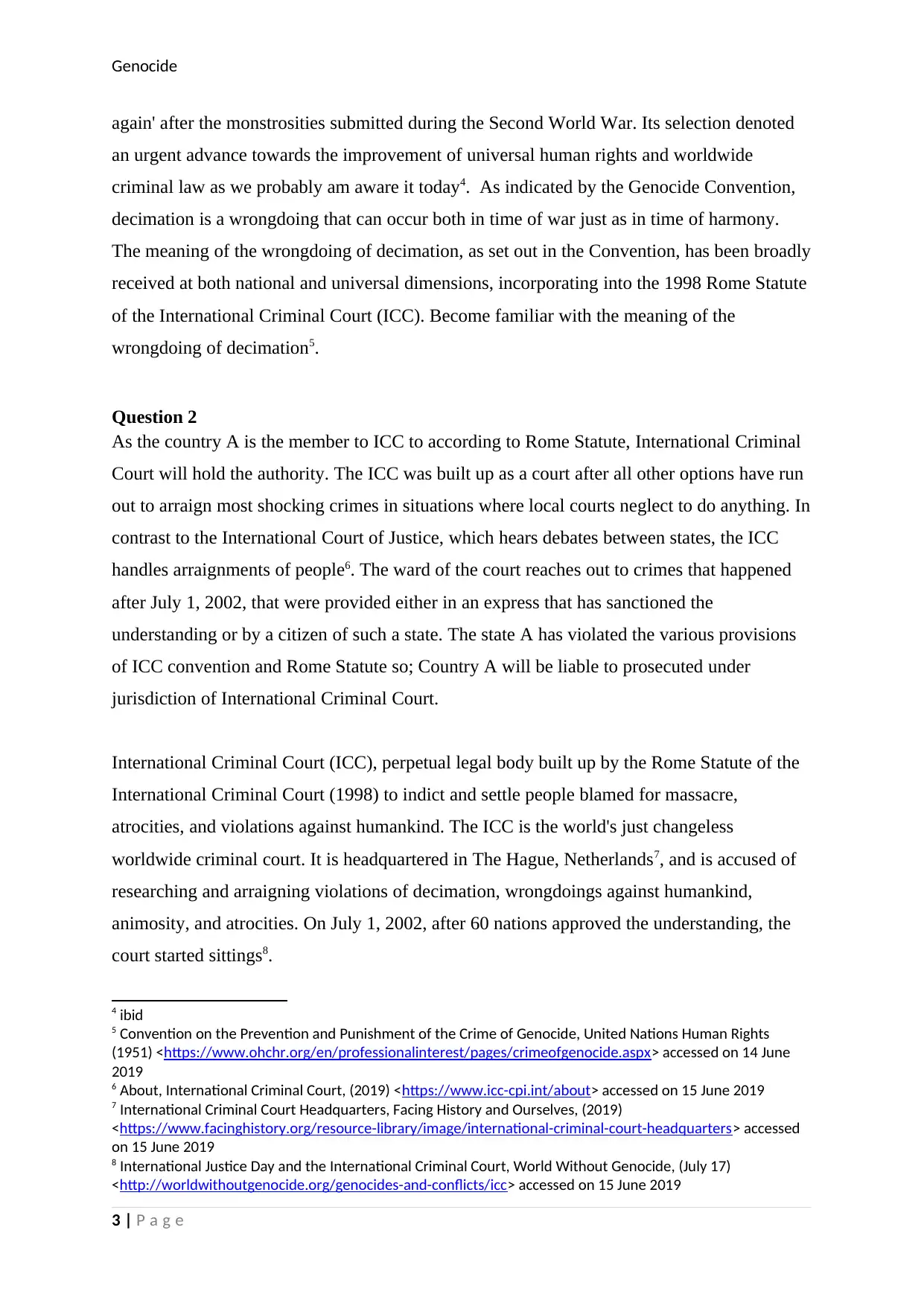
Genocide
again' after the monstrosities submitted during the Second World War. Its selection denoted
an urgent advance towards the improvement of universal human rights and worldwide
criminal law as we probably am aware it today4. As indicated by the Genocide Convention,
decimation is a wrongdoing that can occur both in time of war just as in time of harmony.
The meaning of the wrongdoing of decimation, as set out in the Convention, has been broadly
received at both national and universal dimensions, incorporating into the 1998 Rome Statute
of the International Criminal Court (ICC). Become familiar with the meaning of the
wrongdoing of decimation5.
Question 2
As the country A is the member to ICC to according to Rome Statute, International Criminal
Court will hold the authority. The ICC was built up as a court after all other options have run
out to arraign most shocking crimes in situations where local courts neglect to do anything. In
contrast to the International Court of Justice, which hears debates between states, the ICC
handles arraignments of people6. The ward of the court reaches out to crimes that happened
after July 1, 2002, that were provided either in an express that has sanctioned the
understanding or by a citizen of such a state. The state A has violated the various provisions
of ICC convention and Rome Statute so; Country A will be liable to prosecuted under
jurisdiction of International Criminal Court.
International Criminal Court (ICC), perpetual legal body built up by the Rome Statute of the
International Criminal Court (1998) to indict and settle people blamed for massacre,
atrocities, and violations against humankind. The ICC is the world's just changeless
worldwide criminal court. It is headquartered in The Hague, Netherlands7, and is accused of
researching and arraigning violations of decimation, wrongdoings against humankind,
animosity, and atrocities. On July 1, 2002, after 60 nations approved the understanding, the
court started sittings8.
4 ibid
5 Convention on the Prevention and Punishment of the Crime of Genocide, United Nations Human Rights
(1951) <https://www.ohchr.org/en/professionalinterest/pages/crimeofgenocide.aspx> accessed on 14 June
2019
6 About, International Criminal Court, (2019) <https://www.icc-cpi.int/about> accessed on 15 June 2019
7 International Criminal Court Headquarters, Facing History and Ourselves, (2019)
<https://www.facinghistory.org/resource-library/image/international-criminal-court-headquarters> accessed
on 15 June 2019
8 International Justice Day and the International Criminal Court, World Without Genocide, (July 17)
<http://worldwithoutgenocide.org/genocides-and-conflicts/icc> accessed on 15 June 2019
3 | P a g e
again' after the monstrosities submitted during the Second World War. Its selection denoted
an urgent advance towards the improvement of universal human rights and worldwide
criminal law as we probably am aware it today4. As indicated by the Genocide Convention,
decimation is a wrongdoing that can occur both in time of war just as in time of harmony.
The meaning of the wrongdoing of decimation, as set out in the Convention, has been broadly
received at both national and universal dimensions, incorporating into the 1998 Rome Statute
of the International Criminal Court (ICC). Become familiar with the meaning of the
wrongdoing of decimation5.
Question 2
As the country A is the member to ICC to according to Rome Statute, International Criminal
Court will hold the authority. The ICC was built up as a court after all other options have run
out to arraign most shocking crimes in situations where local courts neglect to do anything. In
contrast to the International Court of Justice, which hears debates between states, the ICC
handles arraignments of people6. The ward of the court reaches out to crimes that happened
after July 1, 2002, that were provided either in an express that has sanctioned the
understanding or by a citizen of such a state. The state A has violated the various provisions
of ICC convention and Rome Statute so; Country A will be liable to prosecuted under
jurisdiction of International Criminal Court.
International Criminal Court (ICC), perpetual legal body built up by the Rome Statute of the
International Criminal Court (1998) to indict and settle people blamed for massacre,
atrocities, and violations against humankind. The ICC is the world's just changeless
worldwide criminal court. It is headquartered in The Hague, Netherlands7, and is accused of
researching and arraigning violations of decimation, wrongdoings against humankind,
animosity, and atrocities. On July 1, 2002, after 60 nations approved the understanding, the
court started sittings8.
4 ibid
5 Convention on the Prevention and Punishment of the Crime of Genocide, United Nations Human Rights
(1951) <https://www.ohchr.org/en/professionalinterest/pages/crimeofgenocide.aspx> accessed on 14 June
2019
6 About, International Criminal Court, (2019) <https://www.icc-cpi.int/about> accessed on 15 June 2019
7 International Criminal Court Headquarters, Facing History and Ourselves, (2019)
<https://www.facinghistory.org/resource-library/image/international-criminal-court-headquarters> accessed
on 15 June 2019
8 International Justice Day and the International Criminal Court, World Without Genocide, (July 17)
<http://worldwithoutgenocide.org/genocides-and-conflicts/icc> accessed on 15 June 2019
3 | P a g e
Secure Best Marks with AI Grader
Need help grading? Try our AI Grader for instant feedback on your assignments.
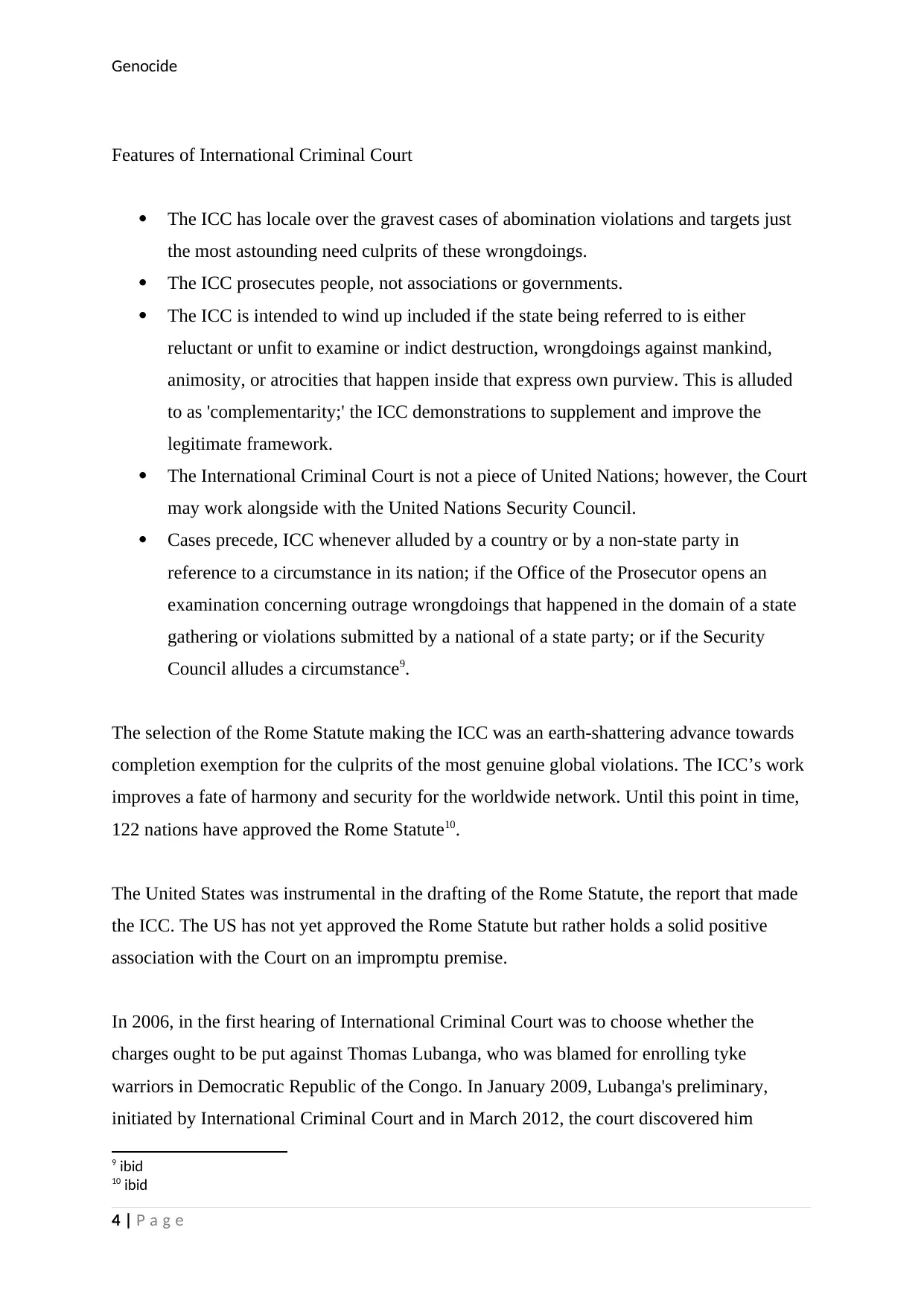
Genocide
Features of International Criminal Court
The ICC has locale over the gravest cases of abomination violations and targets just
the most astounding need culprits of these wrongdoings.
The ICC prosecutes people, not associations or governments.
The ICC is intended to wind up included if the state being referred to is either
reluctant or unfit to examine or indict destruction, wrongdoings against mankind,
animosity, or atrocities that happen inside that express own purview. This is alluded
to as 'complementarity;' the ICC demonstrations to supplement and improve the
legitimate framework.
The International Criminal Court is not a piece of United Nations; however, the Court
may work alongside with the United Nations Security Council.
Cases precede, ICC whenever alluded by a country or by a non-state party in
reference to a circumstance in its nation; if the Office of the Prosecutor opens an
examination concerning outrage wrongdoings that happened in the domain of a state
gathering or violations submitted by a national of a state party; or if the Security
Council alludes a circumstance9.
The selection of the Rome Statute making the ICC was an earth-shattering advance towards
completion exemption for the culprits of the most genuine global violations. The ICC’s work
improves a fate of harmony and security for the worldwide network. Until this point in time,
122 nations have approved the Rome Statute10.
The United States was instrumental in the drafting of the Rome Statute, the report that made
the ICC. The US has not yet approved the Rome Statute but rather holds a solid positive
association with the Court on an impromptu premise.
In 2006, in the first hearing of International Criminal Court was to choose whether the
charges ought to be put against Thomas Lubanga, who was blamed for enrolling tyke
warriors in Democratic Republic of the Congo. In January 2009, Lubanga's preliminary,
initiated by International Criminal Court and in March 2012, the court discovered him
9 ibid
10 ibid
4 | P a g e
Features of International Criminal Court
The ICC has locale over the gravest cases of abomination violations and targets just
the most astounding need culprits of these wrongdoings.
The ICC prosecutes people, not associations or governments.
The ICC is intended to wind up included if the state being referred to is either
reluctant or unfit to examine or indict destruction, wrongdoings against mankind,
animosity, or atrocities that happen inside that express own purview. This is alluded
to as 'complementarity;' the ICC demonstrations to supplement and improve the
legitimate framework.
The International Criminal Court is not a piece of United Nations; however, the Court
may work alongside with the United Nations Security Council.
Cases precede, ICC whenever alluded by a country or by a non-state party in
reference to a circumstance in its nation; if the Office of the Prosecutor opens an
examination concerning outrage wrongdoings that happened in the domain of a state
gathering or violations submitted by a national of a state party; or if the Security
Council alludes a circumstance9.
The selection of the Rome Statute making the ICC was an earth-shattering advance towards
completion exemption for the culprits of the most genuine global violations. The ICC’s work
improves a fate of harmony and security for the worldwide network. Until this point in time,
122 nations have approved the Rome Statute10.
The United States was instrumental in the drafting of the Rome Statute, the report that made
the ICC. The US has not yet approved the Rome Statute but rather holds a solid positive
association with the Court on an impromptu premise.
In 2006, in the first hearing of International Criminal Court was to choose whether the
charges ought to be put against Thomas Lubanga, who was blamed for enrolling tyke
warriors in Democratic Republic of the Congo. In January 2009, Lubanga's preliminary,
initiated by International Criminal Court and in March 2012, the court discovered him
9 ibid
10 ibid
4 | P a g e
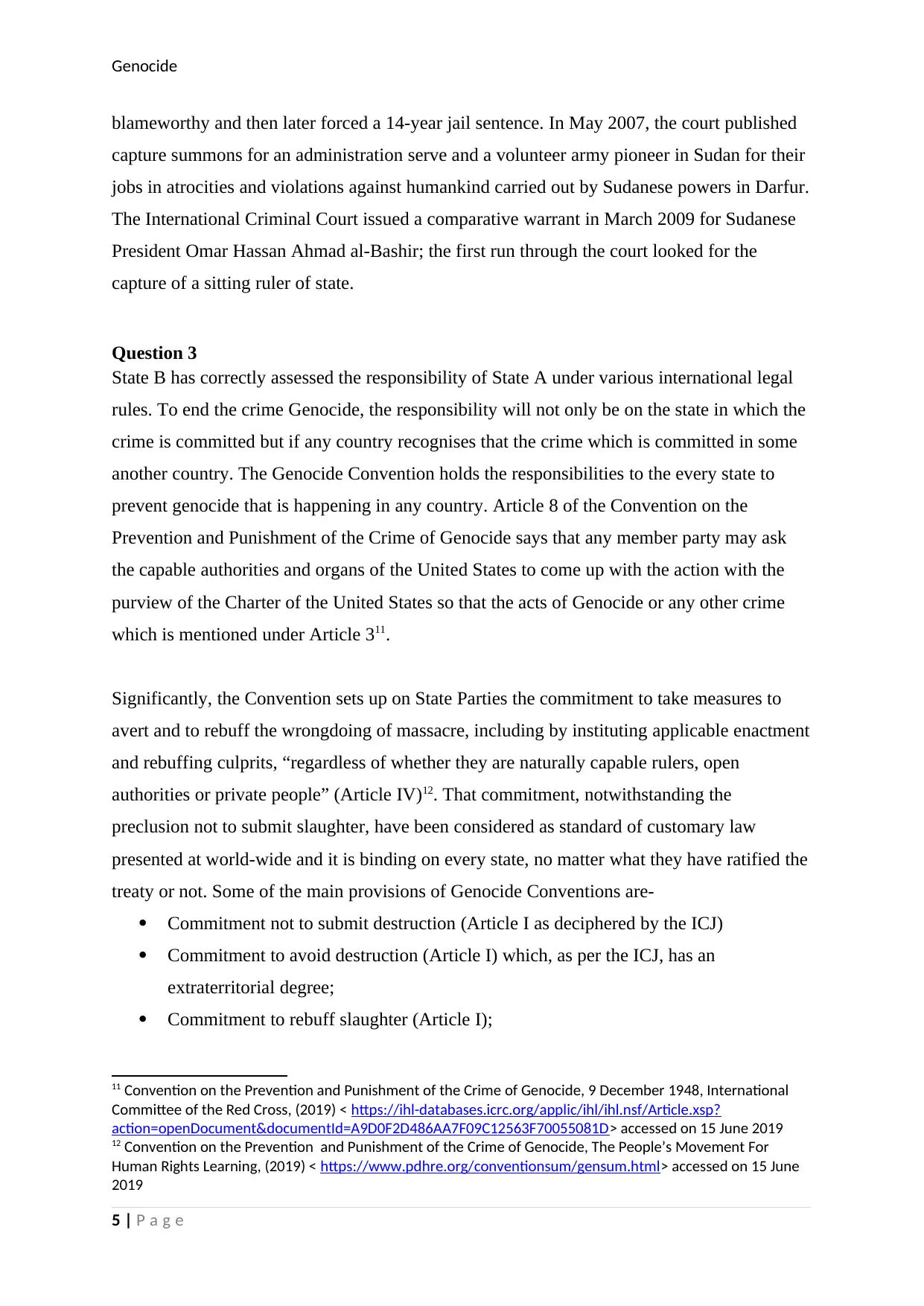
Genocide
blameworthy and then later forced a 14-year jail sentence. In May 2007, the court published
capture summons for an administration serve and a volunteer army pioneer in Sudan for their
jobs in atrocities and violations against humankind carried out by Sudanese powers in Darfur.
The International Criminal Court issued a comparative warrant in March 2009 for Sudanese
President Omar Hassan Ahmad al-Bashir; the first run through the court looked for the
capture of a sitting ruler of state.
Question 3
State B has correctly assessed the responsibility of State A under various international legal
rules. To end the crime Genocide, the responsibility will not only be on the state in which the
crime is committed but if any country recognises that the crime which is committed in some
another country. The Genocide Convention holds the responsibilities to the every state to
prevent genocide that is happening in any country. Article 8 of the Convention on the
Prevention and Punishment of the Crime of Genocide says that any member party may ask
the capable authorities and organs of the United States to come up with the action with the
purview of the Charter of the United States so that the acts of Genocide or any other crime
which is mentioned under Article 311.
Significantly, the Convention sets up on State Parties the commitment to take measures to
avert and to rebuff the wrongdoing of massacre, including by instituting applicable enactment
and rebuffing culprits, “regardless of whether they are naturally capable rulers, open
authorities or private people” (Article IV)12. That commitment, notwithstanding the
preclusion not to submit slaughter, have been considered as standard of customary law
presented at world-wide and it is binding on every state, no matter what they have ratified the
treaty or not. Some of the main provisions of Genocide Conventions are-
Commitment not to submit destruction (Article I as deciphered by the ICJ)
Commitment to avoid destruction (Article I) which, as per the ICJ, has an
extraterritorial degree;
Commitment to rebuff slaughter (Article I);
11 Convention on the Prevention and Punishment of the Crime of Genocide, 9 December 1948, International
Committee of the Red Cross, (2019) < https://ihl-databases.icrc.org/applic/ihl/ihl.nsf/Article.xsp?
action=openDocument&documentId=A9D0F2D486AA7F09C12563F70055081D> accessed on 15 June 2019
12 Convention on the Prevention and Punishment of the Crime of Genocide, The People’s Movement For
Human Rights Learning, (2019) < https://www.pdhre.org/conventionsum/gensum.html> accessed on 15 June
2019
5 | P a g e
blameworthy and then later forced a 14-year jail sentence. In May 2007, the court published
capture summons for an administration serve and a volunteer army pioneer in Sudan for their
jobs in atrocities and violations against humankind carried out by Sudanese powers in Darfur.
The International Criminal Court issued a comparative warrant in March 2009 for Sudanese
President Omar Hassan Ahmad al-Bashir; the first run through the court looked for the
capture of a sitting ruler of state.
Question 3
State B has correctly assessed the responsibility of State A under various international legal
rules. To end the crime Genocide, the responsibility will not only be on the state in which the
crime is committed but if any country recognises that the crime which is committed in some
another country. The Genocide Convention holds the responsibilities to the every state to
prevent genocide that is happening in any country. Article 8 of the Convention on the
Prevention and Punishment of the Crime of Genocide says that any member party may ask
the capable authorities and organs of the United States to come up with the action with the
purview of the Charter of the United States so that the acts of Genocide or any other crime
which is mentioned under Article 311.
Significantly, the Convention sets up on State Parties the commitment to take measures to
avert and to rebuff the wrongdoing of massacre, including by instituting applicable enactment
and rebuffing culprits, “regardless of whether they are naturally capable rulers, open
authorities or private people” (Article IV)12. That commitment, notwithstanding the
preclusion not to submit slaughter, have been considered as standard of customary law
presented at world-wide and it is binding on every state, no matter what they have ratified the
treaty or not. Some of the main provisions of Genocide Conventions are-
Commitment not to submit destruction (Article I as deciphered by the ICJ)
Commitment to avoid destruction (Article I) which, as per the ICJ, has an
extraterritorial degree;
Commitment to rebuff slaughter (Article I);
11 Convention on the Prevention and Punishment of the Crime of Genocide, 9 December 1948, International
Committee of the Red Cross, (2019) < https://ihl-databases.icrc.org/applic/ihl/ihl.nsf/Article.xsp?
action=openDocument&documentId=A9D0F2D486AA7F09C12563F70055081D> accessed on 15 June 2019
12 Convention on the Prevention and Punishment of the Crime of Genocide, The People’s Movement For
Human Rights Learning, (2019) < https://www.pdhre.org/conventionsum/gensum.html> accessed on 15 June
2019
5 | P a g e
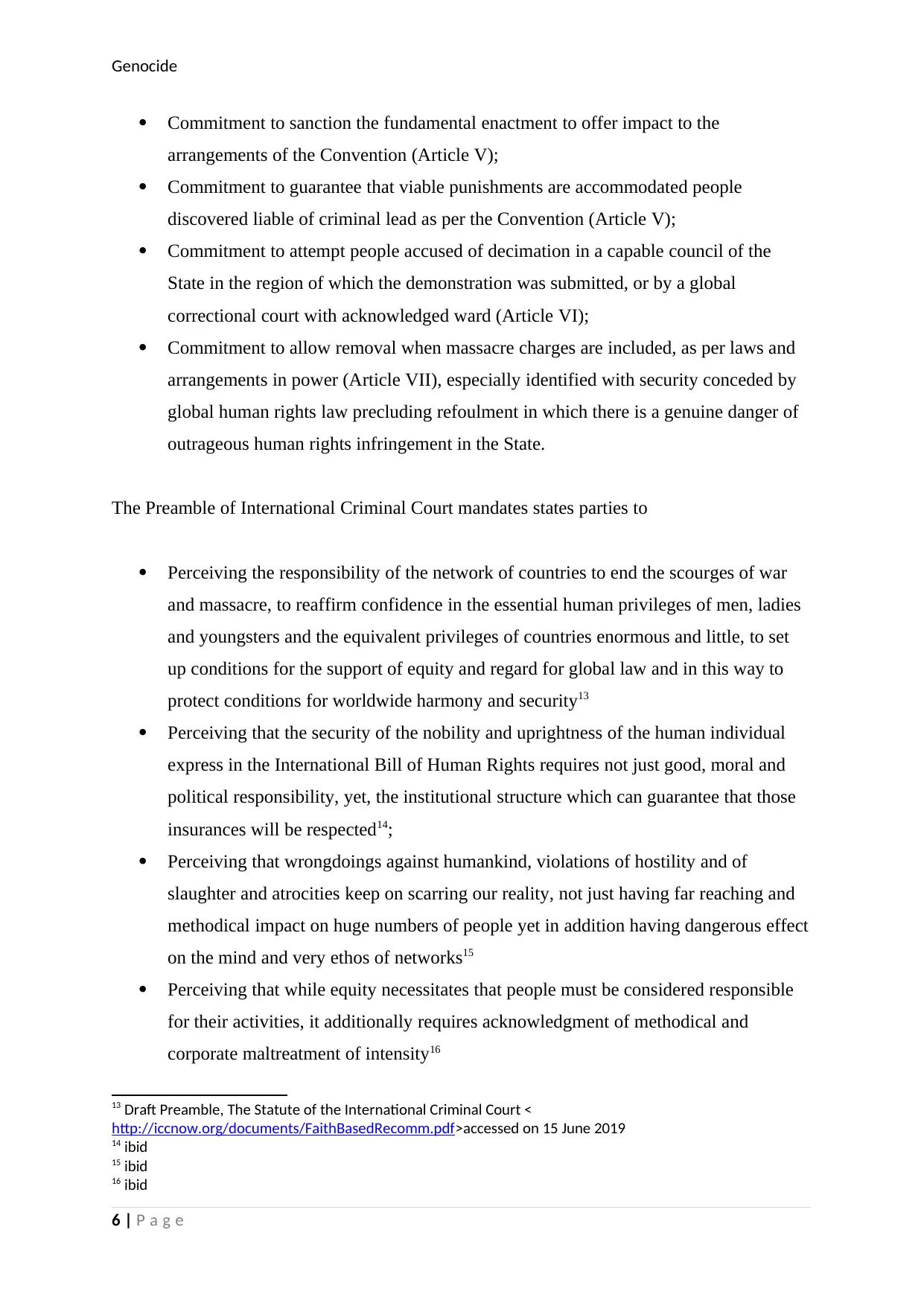
Genocide
Commitment to sanction the fundamental enactment to offer impact to the
arrangements of the Convention (Article V);
Commitment to guarantee that viable punishments are accommodated people
discovered liable of criminal lead as per the Convention (Article V);
Commitment to attempt people accused of decimation in a capable council of the
State in the region of which the demonstration was submitted, or by a global
correctional court with acknowledged ward (Article VI);
Commitment to allow removal when massacre charges are included, as per laws and
arrangements in power (Article VII), especially identified with security conceded by
global human rights law precluding refoulment in which there is a genuine danger of
outrageous human rights infringement in the State.
The Preamble of International Criminal Court mandates states parties to
Perceiving the responsibility of the network of countries to end the scourges of war
and massacre, to reaffirm confidence in the essential human privileges of men, ladies
and youngsters and the equivalent privileges of countries enormous and little, to set
up conditions for the support of equity and regard for global law and in this way to
protect conditions for worldwide harmony and security13
Perceiving that the security of the nobility and uprightness of the human individual
express in the International Bill of Human Rights requires not just good, moral and
political responsibility, yet, the institutional structure which can guarantee that those
insurances will be respected14;
Perceiving that wrongdoings against humankind, violations of hostility and of
slaughter and atrocities keep on scarring our reality, not just having far reaching and
methodical impact on huge numbers of people yet in addition having dangerous effect
on the mind and very ethos of networks15
Perceiving that while equity necessitates that people must be considered responsible
for their activities, it additionally requires acknowledgment of methodical and
corporate maltreatment of intensity16
13 Draft Preamble, The Statute of the International Criminal Court <
http://iccnow.org/documents/FaithBasedRecomm.pdf>accessed on 15 June 2019
14 ibid
15 ibid
16 ibid
6 | P a g e
Commitment to sanction the fundamental enactment to offer impact to the
arrangements of the Convention (Article V);
Commitment to guarantee that viable punishments are accommodated people
discovered liable of criminal lead as per the Convention (Article V);
Commitment to attempt people accused of decimation in a capable council of the
State in the region of which the demonstration was submitted, or by a global
correctional court with acknowledged ward (Article VI);
Commitment to allow removal when massacre charges are included, as per laws and
arrangements in power (Article VII), especially identified with security conceded by
global human rights law precluding refoulment in which there is a genuine danger of
outrageous human rights infringement in the State.
The Preamble of International Criminal Court mandates states parties to
Perceiving the responsibility of the network of countries to end the scourges of war
and massacre, to reaffirm confidence in the essential human privileges of men, ladies
and youngsters and the equivalent privileges of countries enormous and little, to set
up conditions for the support of equity and regard for global law and in this way to
protect conditions for worldwide harmony and security13
Perceiving that the security of the nobility and uprightness of the human individual
express in the International Bill of Human Rights requires not just good, moral and
political responsibility, yet, the institutional structure which can guarantee that those
insurances will be respected14;
Perceiving that wrongdoings against humankind, violations of hostility and of
slaughter and atrocities keep on scarring our reality, not just having far reaching and
methodical impact on huge numbers of people yet in addition having dangerous effect
on the mind and very ethos of networks15
Perceiving that while equity necessitates that people must be considered responsible
for their activities, it additionally requires acknowledgment of methodical and
corporate maltreatment of intensity16
13 Draft Preamble, The Statute of the International Criminal Court <
http://iccnow.org/documents/FaithBasedRecomm.pdf>accessed on 15 June 2019
14 ibid
15 ibid
16 ibid
6 | P a g e
Paraphrase This Document
Need a fresh take? Get an instant paraphrase of this document with our AI Paraphraser
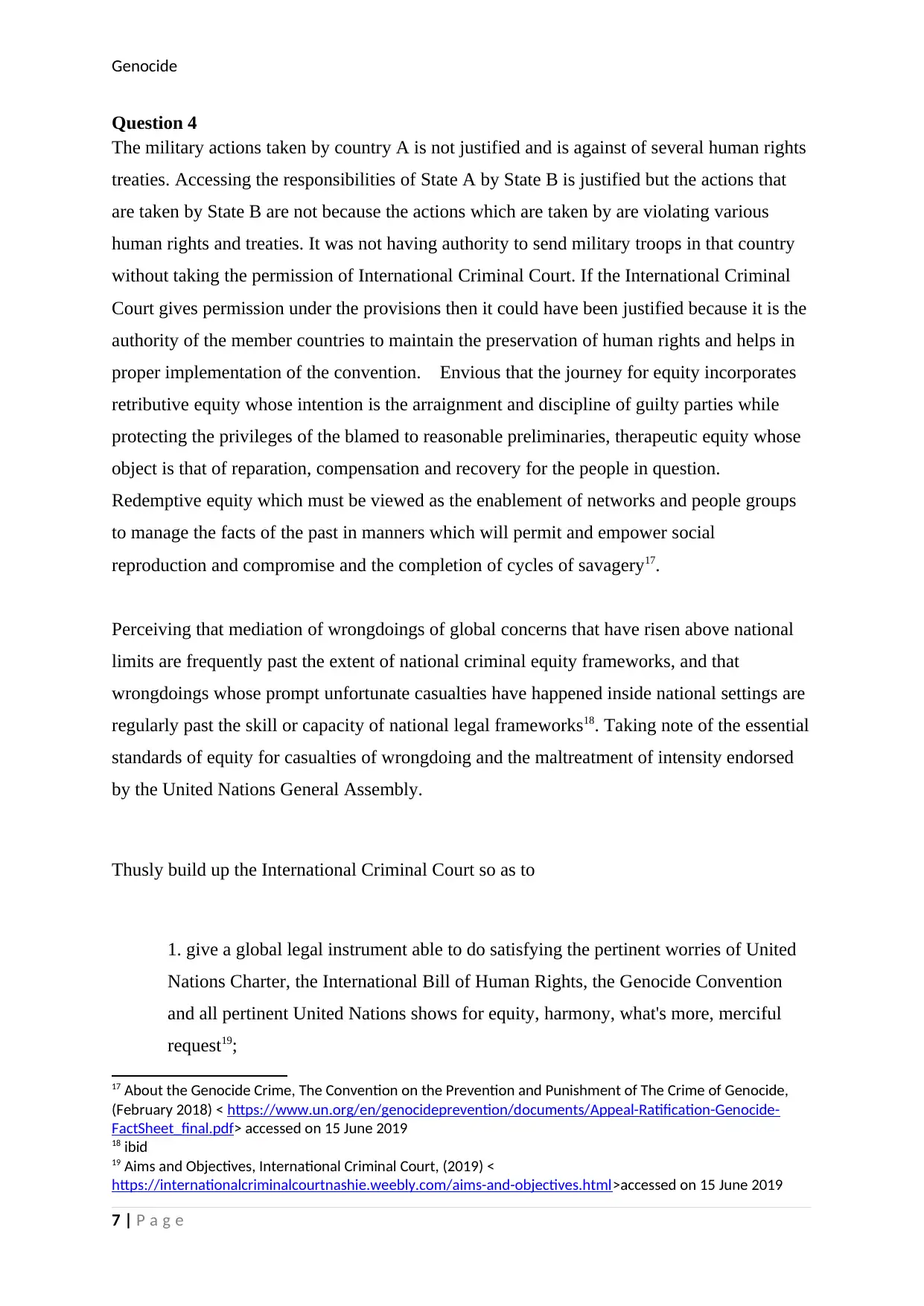
Genocide
Question 4
The military actions taken by country A is not justified and is against of several human rights
treaties. Accessing the responsibilities of State A by State B is justified but the actions that
are taken by State B are not because the actions which are taken by are violating various
human rights and treaties. It was not having authority to send military troops in that country
without taking the permission of International Criminal Court. If the International Criminal
Court gives permission under the provisions then it could have been justified because it is the
authority of the member countries to maintain the preservation of human rights and helps in
proper implementation of the convention. Envious that the journey for equity incorporates
retributive equity whose intention is the arraignment and discipline of guilty parties while
protecting the privileges of the blamed to reasonable preliminaries, therapeutic equity whose
object is that of reparation, compensation and recovery for the people in question.
Redemptive equity which must be viewed as the enablement of networks and people groups
to manage the facts of the past in manners which will permit and empower social
reproduction and compromise and the completion of cycles of savagery17.
Perceiving that mediation of wrongdoings of global concerns that have risen above national
limits are frequently past the extent of national criminal equity frameworks, and that
wrongdoings whose prompt unfortunate casualties have happened inside national settings are
regularly past the skill or capacity of national legal frameworks18. Taking note of the essential
standards of equity for casualties of wrongdoing and the maltreatment of intensity endorsed
by the United Nations General Assembly.
Thusly build up the International Criminal Court so as to
1. give a global legal instrument able to do satisfying the pertinent worries of United
Nations Charter, the International Bill of Human Rights, the Genocide Convention
and all pertinent United Nations shows for equity, harmony, what's more, merciful
request19;
17 About the Genocide Crime, The Convention on the Prevention and Punishment of The Crime of Genocide,
(February 2018) < https://www.un.org/en/genocideprevention/documents/Appeal-Ratification-Genocide-
FactSheet_final.pdf> accessed on 15 June 2019
18 ibid
19 Aims and Objectives, International Criminal Court, (2019) <
https://internationalcriminalcourtnashie.weebly.com/aims-and-objectives.html>accessed on 15 June 2019
7 | P a g e
Question 4
The military actions taken by country A is not justified and is against of several human rights
treaties. Accessing the responsibilities of State A by State B is justified but the actions that
are taken by State B are not because the actions which are taken by are violating various
human rights and treaties. It was not having authority to send military troops in that country
without taking the permission of International Criminal Court. If the International Criminal
Court gives permission under the provisions then it could have been justified because it is the
authority of the member countries to maintain the preservation of human rights and helps in
proper implementation of the convention. Envious that the journey for equity incorporates
retributive equity whose intention is the arraignment and discipline of guilty parties while
protecting the privileges of the blamed to reasonable preliminaries, therapeutic equity whose
object is that of reparation, compensation and recovery for the people in question.
Redemptive equity which must be viewed as the enablement of networks and people groups
to manage the facts of the past in manners which will permit and empower social
reproduction and compromise and the completion of cycles of savagery17.
Perceiving that mediation of wrongdoings of global concerns that have risen above national
limits are frequently past the extent of national criminal equity frameworks, and that
wrongdoings whose prompt unfortunate casualties have happened inside national settings are
regularly past the skill or capacity of national legal frameworks18. Taking note of the essential
standards of equity for casualties of wrongdoing and the maltreatment of intensity endorsed
by the United Nations General Assembly.
Thusly build up the International Criminal Court so as to
1. give a global legal instrument able to do satisfying the pertinent worries of United
Nations Charter, the International Bill of Human Rights, the Genocide Convention
and all pertinent United Nations shows for equity, harmony, what's more, merciful
request19;
17 About the Genocide Crime, The Convention on the Prevention and Punishment of The Crime of Genocide,
(February 2018) < https://www.un.org/en/genocideprevention/documents/Appeal-Ratification-Genocide-
FactSheet_final.pdf> accessed on 15 June 2019
18 ibid
19 Aims and Objectives, International Criminal Court, (2019) <
https://internationalcriminalcourtnashie.weebly.com/aims-and-objectives.html>accessed on 15 June 2019
7 | P a g e
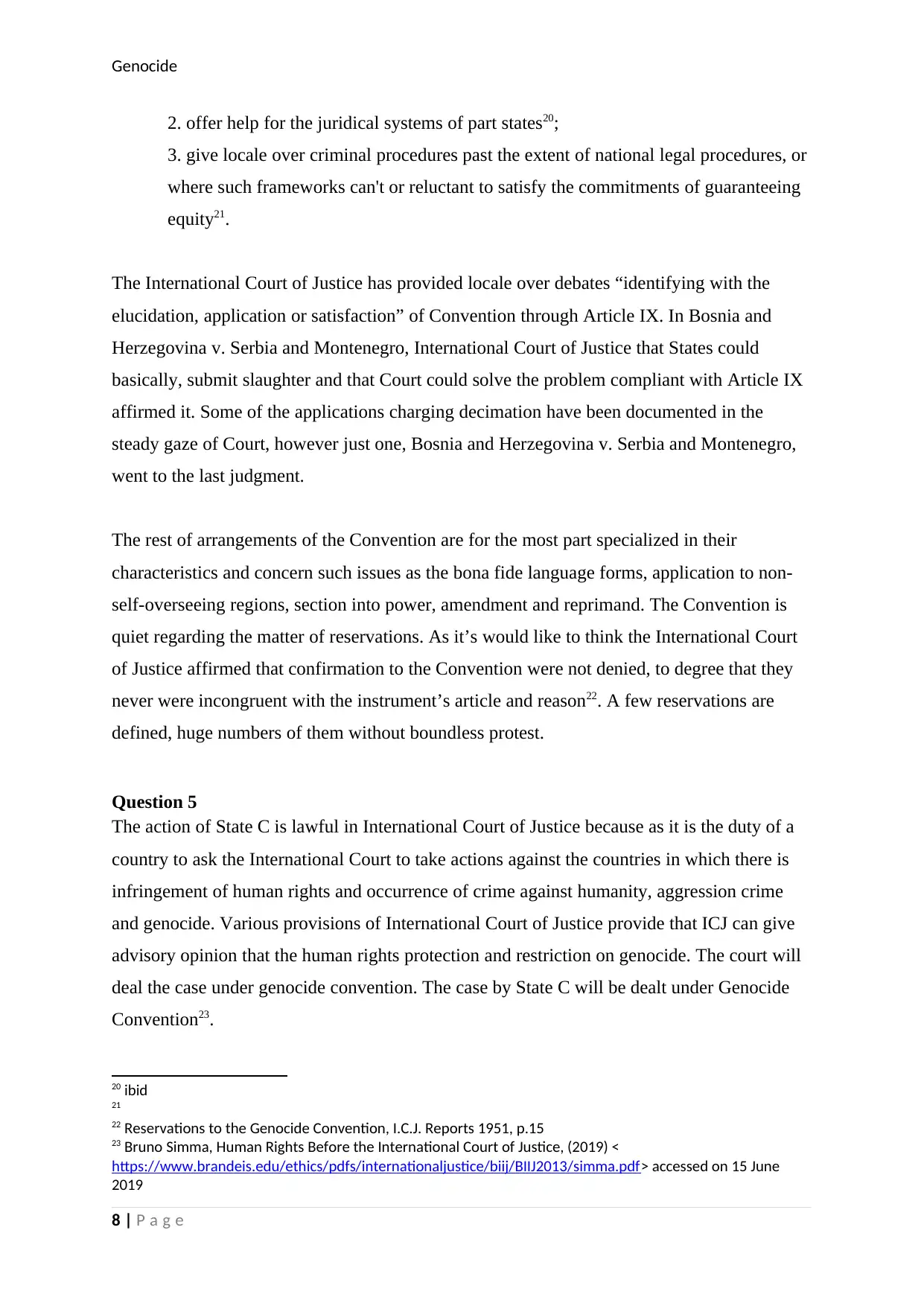
Genocide
2. offer help for the juridical systems of part states20;
3. give locale over criminal procedures past the extent of national legal procedures, or
where such frameworks can't or reluctant to satisfy the commitments of guaranteeing
equity21.
The International Court of Justice has provided locale over debates “identifying with the
elucidation, application or satisfaction” of Convention through Article IX. In Bosnia and
Herzegovina v. Serbia and Montenegro, International Court of Justice that States could
basically, submit slaughter and that Court could solve the problem compliant with Article IX
affirmed it. Some of the applications charging decimation have been documented in the
steady gaze of Court, however just one, Bosnia and Herzegovina v. Serbia and Montenegro,
went to the last judgment.
The rest of arrangements of the Convention are for the most part specialized in their
characteristics and concern such issues as the bona fide language forms, application to non-
self-overseeing regions, section into power, amendment and reprimand. The Convention is
quiet regarding the matter of reservations. As it’s would like to think the International Court
of Justice affirmed that confirmation to the Convention were not denied, to degree that they
never were incongruent with the instrument’s article and reason22. A few reservations are
defined, huge numbers of them without boundless protest.
Question 5
The action of State C is lawful in International Court of Justice because as it is the duty of a
country to ask the International Court to take actions against the countries in which there is
infringement of human rights and occurrence of crime against humanity, aggression crime
and genocide. Various provisions of International Court of Justice provide that ICJ can give
advisory opinion that the human rights protection and restriction on genocide. The court will
deal the case under genocide convention. The case by State C will be dealt under Genocide
Convention23.
20 ibid
21
22 Reservations to the Genocide Convention, I.C.J. Reports 1951, p.15
23 Bruno Simma, Human Rights Before the International Court of Justice, (2019) <
https://www.brandeis.edu/ethics/pdfs/internationaljustice/biij/BIIJ2013/simma.pdf> accessed on 15 June
2019
8 | P a g e
2. offer help for the juridical systems of part states20;
3. give locale over criminal procedures past the extent of national legal procedures, or
where such frameworks can't or reluctant to satisfy the commitments of guaranteeing
equity21.
The International Court of Justice has provided locale over debates “identifying with the
elucidation, application or satisfaction” of Convention through Article IX. In Bosnia and
Herzegovina v. Serbia and Montenegro, International Court of Justice that States could
basically, submit slaughter and that Court could solve the problem compliant with Article IX
affirmed it. Some of the applications charging decimation have been documented in the
steady gaze of Court, however just one, Bosnia and Herzegovina v. Serbia and Montenegro,
went to the last judgment.
The rest of arrangements of the Convention are for the most part specialized in their
characteristics and concern such issues as the bona fide language forms, application to non-
self-overseeing regions, section into power, amendment and reprimand. The Convention is
quiet regarding the matter of reservations. As it’s would like to think the International Court
of Justice affirmed that confirmation to the Convention were not denied, to degree that they
never were incongruent with the instrument’s article and reason22. A few reservations are
defined, huge numbers of them without boundless protest.
Question 5
The action of State C is lawful in International Court of Justice because as it is the duty of a
country to ask the International Court to take actions against the countries in which there is
infringement of human rights and occurrence of crime against humanity, aggression crime
and genocide. Various provisions of International Court of Justice provide that ICJ can give
advisory opinion that the human rights protection and restriction on genocide. The court will
deal the case under genocide convention. The case by State C will be dealt under Genocide
Convention23.
20 ibid
21
22 Reservations to the Genocide Convention, I.C.J. Reports 1951, p.15
23 Bruno Simma, Human Rights Before the International Court of Justice, (2019) <
https://www.brandeis.edu/ethics/pdfs/internationaljustice/biij/BIIJ2013/simma.pdf> accessed on 15 June
2019
8 | P a g e
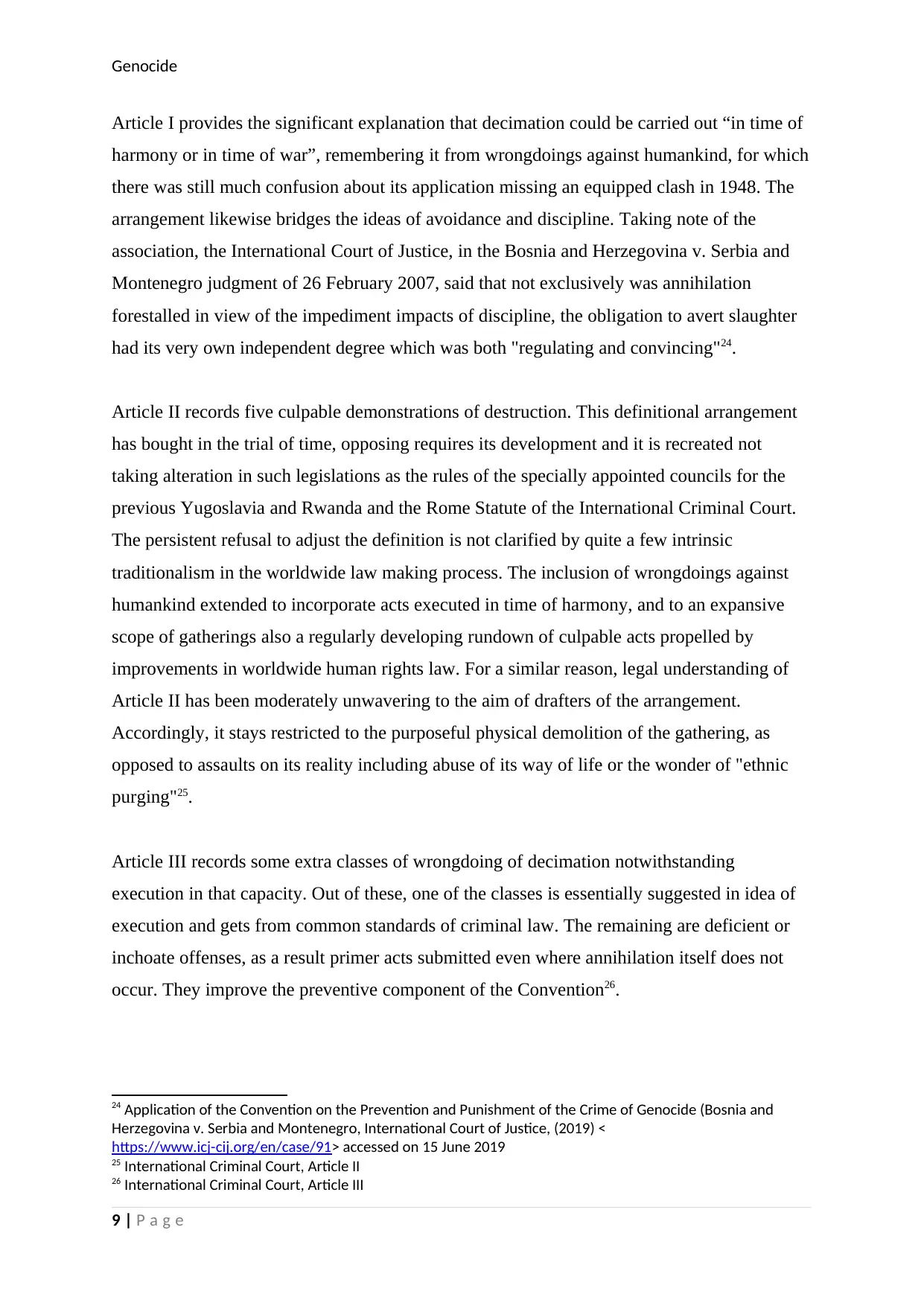
Genocide
Article I provides the significant explanation that decimation could be carried out “in time of
harmony or in time of war”, remembering it from wrongdoings against humankind, for which
there was still much confusion about its application missing an equipped clash in 1948. The
arrangement likewise bridges the ideas of avoidance and discipline. Taking note of the
association, the International Court of Justice, in the Bosnia and Herzegovina v. Serbia and
Montenegro judgment of 26 February 2007, said that not exclusively was annihilation
forestalled in view of the impediment impacts of discipline, the obligation to avert slaughter
had its very own independent degree which was both "regulating and convincing"24.
Article II records five culpable demonstrations of destruction. This definitional arrangement
has bought in the trial of time, opposing requires its development and it is recreated not
taking alteration in such legislations as the rules of the specially appointed councils for the
previous Yugoslavia and Rwanda and the Rome Statute of the International Criminal Court.
The persistent refusal to adjust the definition is not clarified by quite a few intrinsic
traditionalism in the worldwide law making process. The inclusion of wrongdoings against
humankind extended to incorporate acts executed in time of harmony, and to an expansive
scope of gatherings also a regularly developing rundown of culpable acts propelled by
improvements in worldwide human rights law. For a similar reason, legal understanding of
Article II has been moderately unwavering to the aim of drafters of the arrangement.
Accordingly, it stays restricted to the purposeful physical demolition of the gathering, as
opposed to assaults on its reality including abuse of its way of life or the wonder of "ethnic
purging"25.
Article III records some extra classes of wrongdoing of decimation notwithstanding
execution in that capacity. Out of these, one of the classes is essentially suggested in idea of
execution and gets from common standards of criminal law. The remaining are deficient or
inchoate offenses, as a result primer acts submitted even where annihilation itself does not
occur. They improve the preventive component of the Convention26.
24 Application of the Convention on the Prevention and Punishment of the Crime of Genocide (Bosnia and
Herzegovina v. Serbia and Montenegro, International Court of Justice, (2019) <
https://www.icj-cij.org/en/case/91> accessed on 15 June 2019
25 International Criminal Court, Article II
26 International Criminal Court, Article III
9 | P a g e
Article I provides the significant explanation that decimation could be carried out “in time of
harmony or in time of war”, remembering it from wrongdoings against humankind, for which
there was still much confusion about its application missing an equipped clash in 1948. The
arrangement likewise bridges the ideas of avoidance and discipline. Taking note of the
association, the International Court of Justice, in the Bosnia and Herzegovina v. Serbia and
Montenegro judgment of 26 February 2007, said that not exclusively was annihilation
forestalled in view of the impediment impacts of discipline, the obligation to avert slaughter
had its very own independent degree which was both "regulating and convincing"24.
Article II records five culpable demonstrations of destruction. This definitional arrangement
has bought in the trial of time, opposing requires its development and it is recreated not
taking alteration in such legislations as the rules of the specially appointed councils for the
previous Yugoslavia and Rwanda and the Rome Statute of the International Criminal Court.
The persistent refusal to adjust the definition is not clarified by quite a few intrinsic
traditionalism in the worldwide law making process. The inclusion of wrongdoings against
humankind extended to incorporate acts executed in time of harmony, and to an expansive
scope of gatherings also a regularly developing rundown of culpable acts propelled by
improvements in worldwide human rights law. For a similar reason, legal understanding of
Article II has been moderately unwavering to the aim of drafters of the arrangement.
Accordingly, it stays restricted to the purposeful physical demolition of the gathering, as
opposed to assaults on its reality including abuse of its way of life or the wonder of "ethnic
purging"25.
Article III records some extra classes of wrongdoing of decimation notwithstanding
execution in that capacity. Out of these, one of the classes is essentially suggested in idea of
execution and gets from common standards of criminal law. The remaining are deficient or
inchoate offenses, as a result primer acts submitted even where annihilation itself does not
occur. They improve the preventive component of the Convention26.
24 Application of the Convention on the Prevention and Punishment of the Crime of Genocide (Bosnia and
Herzegovina v. Serbia and Montenegro, International Court of Justice, (2019) <
https://www.icj-cij.org/en/case/91> accessed on 15 June 2019
25 International Criminal Court, Article II
26 International Criminal Court, Article III
9 | P a g e
Secure Best Marks with AI Grader
Need help grading? Try our AI Grader for instant feedback on your assignments.
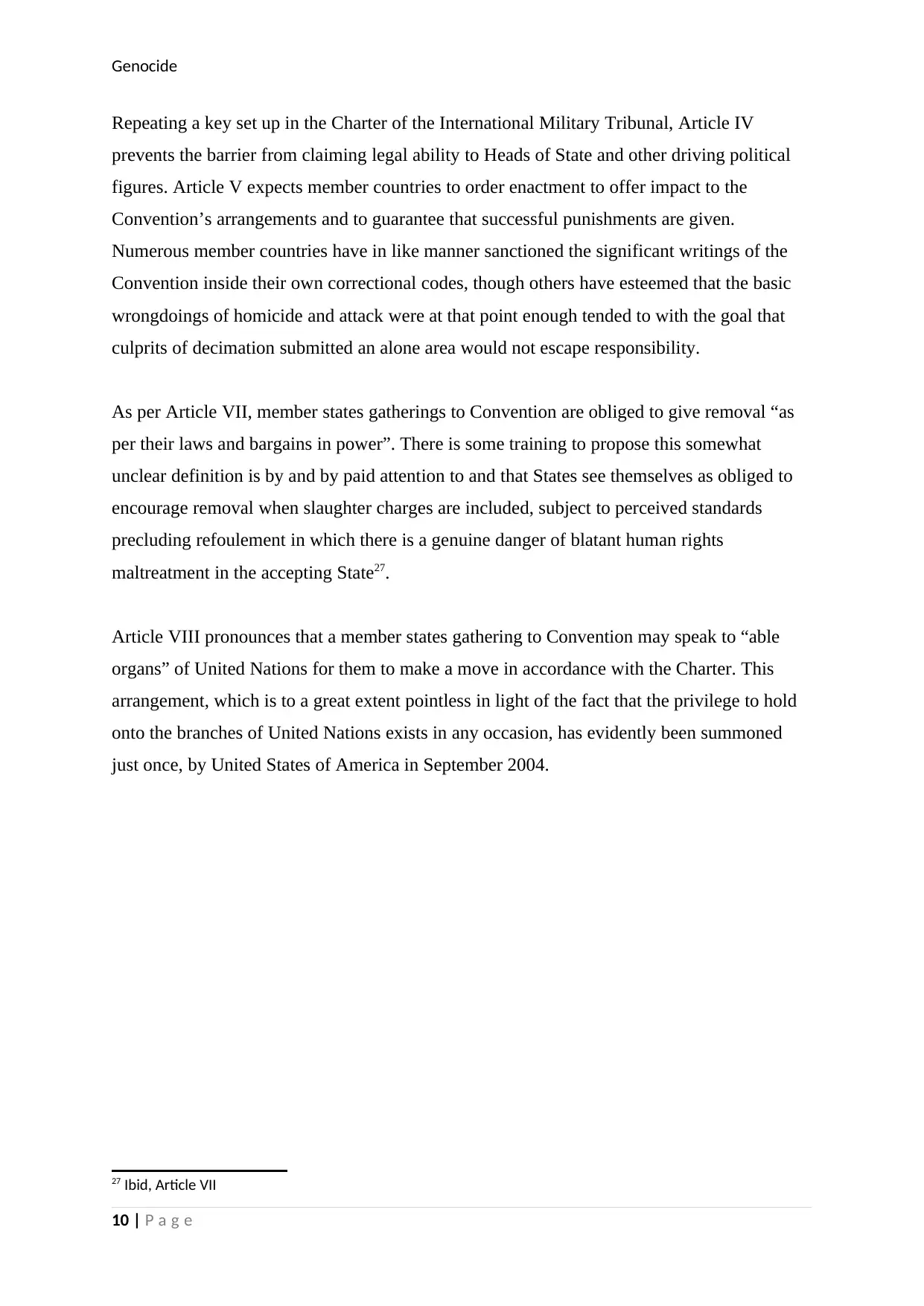
Genocide
Repeating a key set up in the Charter of the International Military Tribunal, Article IV
prevents the barrier from claiming legal ability to Heads of State and other driving political
figures. Article V expects member countries to order enactment to offer impact to the
Convention’s arrangements and to guarantee that successful punishments are given.
Numerous member countries have in like manner sanctioned the significant writings of the
Convention inside their own correctional codes, though others have esteemed that the basic
wrongdoings of homicide and attack were at that point enough tended to with the goal that
culprits of decimation submitted an alone area would not escape responsibility.
As per Article VII, member states gatherings to Convention are obliged to give removal “as
per their laws and bargains in power”. There is some training to propose this somewhat
unclear definition is by and by paid attention to and that States see themselves as obliged to
encourage removal when slaughter charges are included, subject to perceived standards
precluding refoulement in which there is a genuine danger of blatant human rights
maltreatment in the accepting State27.
Article VIII pronounces that a member states gathering to Convention may speak to “able
organs” of United Nations for them to make a move in accordance with the Charter. This
arrangement, which is to a great extent pointless in light of the fact that the privilege to hold
onto the branches of United Nations exists in any occasion, has evidently been summoned
just once, by United States of America in September 2004.
27 Ibid, Article VII
10 | P a g e
Repeating a key set up in the Charter of the International Military Tribunal, Article IV
prevents the barrier from claiming legal ability to Heads of State and other driving political
figures. Article V expects member countries to order enactment to offer impact to the
Convention’s arrangements and to guarantee that successful punishments are given.
Numerous member countries have in like manner sanctioned the significant writings of the
Convention inside their own correctional codes, though others have esteemed that the basic
wrongdoings of homicide and attack were at that point enough tended to with the goal that
culprits of decimation submitted an alone area would not escape responsibility.
As per Article VII, member states gatherings to Convention are obliged to give removal “as
per their laws and bargains in power”. There is some training to propose this somewhat
unclear definition is by and by paid attention to and that States see themselves as obliged to
encourage removal when slaughter charges are included, subject to perceived standards
precluding refoulement in which there is a genuine danger of blatant human rights
maltreatment in the accepting State27.
Article VIII pronounces that a member states gathering to Convention may speak to “able
organs” of United Nations for them to make a move in accordance with the Charter. This
arrangement, which is to a great extent pointless in light of the fact that the privilege to hold
onto the branches of United Nations exists in any occasion, has evidently been summoned
just once, by United States of America in September 2004.
27 Ibid, Article VII
10 | P a g e
1 out of 11
Related Documents
Your All-in-One AI-Powered Toolkit for Academic Success.
+13062052269
info@desklib.com
Available 24*7 on WhatsApp / Email
![[object Object]](/_next/static/media/star-bottom.7253800d.svg)
Unlock your academic potential
© 2024 | Zucol Services PVT LTD | All rights reserved.





